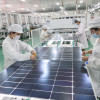US to raise tariffs on Chinese electric vehicles: report

The United States is planning to increase tariffs on Chinese clean energy goods, news reports said Friday, with levies on electric vehicles expected to roughly quadruple.
The move, reported by the Wall Street Journal, comes at the end of a long-awaited review of tariffs that were imposed during a trade war between Washington and Beijing.
Then-president Donald Trump imposed tariffs on some $300 billion in goods from China.
Officials have since initiated a review of the actions, with the US Trade Representative required to look into the impact of the levies -- first introduced in 2018 -- after four years.
A decision, expected on the coming Tuesday according to news reports, would come as President Joe Biden gears up for a rematch with Trump in November's presidential election.
Last month, he urged for a tripling on tariffs for Chinese steel and aluminum as he courted blue-collar voters in the battleground state of Pennsylvania.
In particular, higher tariffs are set to impact critical minerals and solar goods as well as batteries from China, said the Wall Street Journal.
The tariff rate on EVs is also due to rise from 25 percent to around 100 percent, the report added.
This is unlikely to deal an immediate blow to Chinese EV companies, which do not have a large presence in the United States due to existing levies.
But officials appear to be guarding against Chinese imports.
Treasury Secretary Janet Yellen recently warned against overcapacity in China, which risks a flood of below-cost goods in the global market, potentially impacting burgeoning US industries.
The United States has been seeking to build up its domestic green tech supply chains, and has been especially concerned about excess capacity in industries such as EVs, batteries and solar energy.
Tariff actions would build on earlier moves by the Biden administration, such as a recent probe into the national security risks posed by Chinese tech in cars.
A concern is that they could be used to collect sensitive data.
Washington has also launched an investigation into China's trade practices in the shipbuilding, maritime and logistics sectors, prompting a furious response from Beijing.
Biden has denied that there was a trade war with China despite calling for a hike in steel tariffs.

 For all latest news, follow The Daily Star's Google News channel.
For all latest news, follow The Daily Star's Google News channel. 








Comments